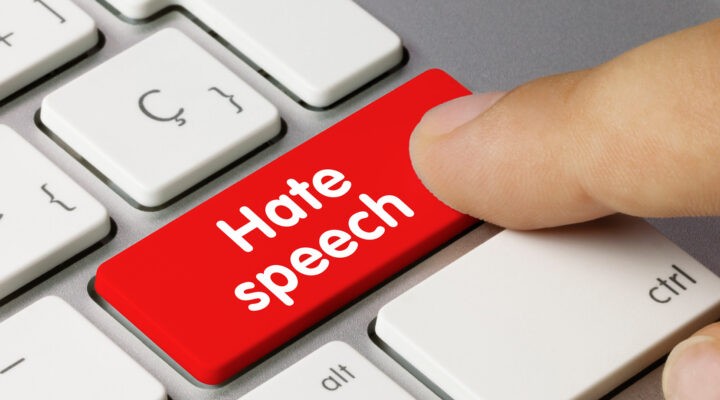The United States has a vital role to play in ensuring social media companies develop new policies and technologies to better protect religious freedom and human rights online, a federal agency reported.
The U.S. Commission on International Religious Freedom also suggested the government should expose the social media practices of other nations that create environments hostile to religious minorities and belief, and to use government social media accounts to combat hate speech and disinformation aimed at religious communities.
“USCIRF has recommended that the U.S. government work with other governments to consider and define the responsibility of social media companies to abide by international human rights law on their platforms,” the commission said in its Dec. 3 fact sheet on “Protecting Religious Freedom Online.”
The report examined international human rights standards as they apply to the regulation of online speech that affects freedom of religion. The study also outlined how content moderation policies used by social media companies affect religious freedom.
USCIRF acknowledged the balancing act required by government and social media firms to protect both religious freedom and free speech rights: “Governments’ and social media companies’ insufficient responses to online hate can result in grave human rights violations. At the same time, removing or censoring protected speech online can also impede human rights.”
The agency also described the sheer magnitude of the challenge of attempting through legislative or company practices to combat social media content hostile to faith groups and beliefs.
“Facebook, for instance, governs more communication than any government and removes three million pieces of hate speech a month, or more than 4,000 an hour.”
“The volume of speech, and hate speech, being shared and regulated online is astonishing. Facebook, for instance, governs more communication than any government and removes three million pieces of hate speech a month, or more than 4,000 an hour.”
The report cited a United Nations expert who found that “at least 70% of the victims of hate and incitement to violence and discrimination online are minorities, including many members of religious minority communities.”
The fact sheet referenced another U.N. study that “raised concern regarding the wide dissemination of hate speech online targeting religious groups, including anti-Muslim and antisemitic hatred and conspiracy theories.”
But developments in Myanmar, where ethnic and religious minorities are brutally oppressed, illustrate the weaponization of social media against religious groups, and how difficult it can be for social media companies to stop it, USCIRF said in citing a 2019 U.N. study.
“Hate speech against the Rohingya (Muslim minority) also continues to be disseminated on social media platforms. Facebook is the leading platform for hate speech in Myanmar,” according to that report.
The abuse continued even after the social media giant removed the pages of key instigators of online hate speech in the nation formerly known as Burma. But unofficial pages with virtual identities sprung up in their place, the U.N. reported.
“In February 2019, Facebook shut down the official pages of the Arakan Army, the Kachin Independence Army, the Myanmar Democratic Alliance Army and the Ta’ang National Liberation Army, which were identified as ‘dangerous organizations’ in an effort to ‘reduce the likelihood that Facebook will be used to facilitate offline harm.’”
Those organizations responded by setting up new pages with virtual identities, the U.N. added.
Social media also has been used by governments and individuals to enforce blasphemy laws, which some nations use to criminalize diverse religious expression, USCIRF reported. A quarter of all cases of alleged blasphemous speech have occurred on social media.
“Of the enforcement cases and incidents in which social media was implicated, Facebook was involved in nearly half of the cases. Cases were also found involving Twitter, Vkontakte, YouTube, Instagram, WhatsApp, and Telegram. Enforcement of blasphemy laws has broad implications for the freedom of expression and, consequently, the freedom of religion or belief,” the report explained.
Facebook responded by publishing statistics on content it removes from its site, USCIRF said.
“According to these transparency reports, between July and December 2020, Facebook restricted access in Pakistan to 1,531 items reported by the Pakistan Telecommunication Authority as allegedly in violation of the local blasphemy law. During the same period, Facebook restricted access to additional content pursuant to government requests that it allegedly violated local blasphemy laws, including in Bangladesh and Indonesia.”
But even improvements in policies, technology and artificial intelligence can be stymied by the gray area between what is, and what isn’t, hate speech.
“Speech that seeks to counter hate speech narratives can be indistinguishable to an algorithm from imminent incitement or other forms of hate speech.”
“Restrictions and removal measures can also disproportionately affect religious communities,” the report noted. “Speech that seeks to counter hate speech narratives can be indistinguishable to an algorithm from imminent incitement or other forms of hate speech.”
The human element also has its limitations, the report continued. “Alongside automated tools, some social media companies also rely on users and third parties to flag hate speech. The bias of those using these notification systems can also impact religious communities, alongside the human bias inherent in algorithms.”
Governmental efforts to protect religious freedom in online contexts is just as complicated, USCIRF said.
“When regulating intermediaries, states have a dual responsibility to protect rights by ensuring legal content remains online, while also enforcing the boundaries of the freedom of expression by removing unlawful content. Under international human rights law, states are required to take measures to ensure that incitement to genocide and imminent incitement are prohibited online.”
But knowing what to ban and what to allow isn’t always easy to determine. “Online blasphemy prohibitions and overly broad definitions of hate speech, such as those that ban incitement of ‘religious discord,’ are problematic for this reason,” USCIRF said.
Related article:
Is it time to separate church and social media like we have separated church and state? | Opinion by Curtis Ramsey-Lucas


